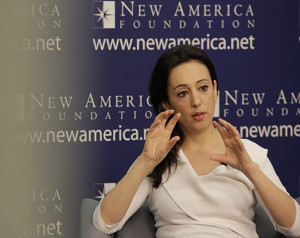
Rania Abouzeid, award-winning journalist describes her reporting experience in Syria at the New American Foundation in Washington, D.C.
WASHINGTON – There are “few signs” that the Syrian conflict will end in the near future, and the situation has become even more dangerous for journalists, according to award-winning reporter Rania Abouzeid, who has covered the Middle East and is especially known for her Syria coverage.
“If it was hard two years ago…it’s only going to get more complicated,” said Abouzeid at a New America Foundation event Nov. 3, responding to a question about U.S. involvement in the conflict, which started in 2011.
Abouzeid said being a female freelance journalist in Syria was definitely dangerous, but she worked alone because she could blend into the population as much or as little as she wanted, she said. The Australian of Lebanese descent said that being a woman and being able to speak the language helped her keep a low profile.
“I can’t do my work without the extreme generosity of Syrians,” she said.
One day after her talk, an Iraqi cameraman was reported murdered in Northern Syria by a Jihadi group in the region.
“His death underscores the importance of a concerted effort by the international community, by Syrian and international media freedom organizations and by all news providers to combat those who want to gag the media and silence those who work for them,” Reporters without Borders said in a news release.
Yasser Faysal Al-Joumaili, who often worked for Al-Jazeera America and Reuters was the eighth foreign journalist to be killed in Syria since the beginning of the uprising, Reporters without Borders said.
When the Libyan uprising started in Feb. 2011, Abouzeid told her editor she wanted to go to Damascus. She hoped to see how Syria reacted to the beginning of the Arab Spring in countries like Egypt and Libya.
At the beginning, she witnessed the peaceful candle-lit vigils, and the strong reaction they elicited from the regime.
“There was a liveliness, a cadence…there was an energy to the Syrian protest that I hadn’t seen in Tunis or in Egypt,” she said. “It was clear from the beginning that it was going to be existential for both sides”
Soon, things started to unravel.
“Very few of them flinched when the bullets started to fly…but that was the early days, it’s a very different picture now.”
In January 2012, groups with more extreme Islamist ideology such as Islamic State of Iraq and the Levant and Jamat Al Nusra joined the fight. Although groups within the armed rebellion didn’t agree with the ideology, they needed them.
It was like “a marriage of convenience,” Abouzeid said. At the same time, U.S. reservations on intervening boosted the support for these outfits and deepened resentment against America.
“A sense of abandonment, which was always there, has deepened,” she said.
“If the only assistance was the guys with the beards and the pants,” she added, then the fighters against the regime just had to take that.
But some people are sitting out the fight ever since some of these more extreme outfits have entered into it, saying that it’s too “dirty,” she said.
Regardless of political affiliation, ”there are people in the middle,” Abouzeid said, and they’re tired of the bloodshed.
She described Syrian cities she saw when she was there a few months ago as being “sliced open” by the destruction caused by fighting, with rubble pouring out on to the street. Militia groups controlled basic amenities like electricity and water, and inflation has skyrocketed. Hospitals were the worst hit, she said, and children were being operated on without anesthetics, she said.
Now, all the Syrians just want the basics like being able to go in to the grocery store without the fear of being shelled, she said.
“They just want some semblance of peace.”





